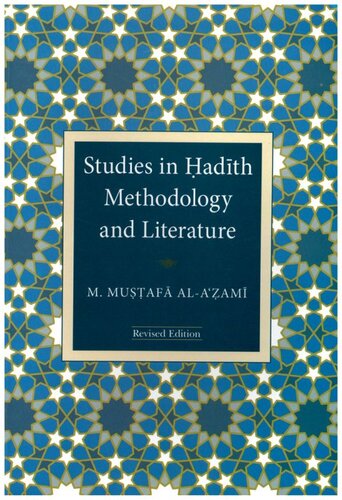

Most ebook files are in PDF format, so you can easily read them using various software such as Foxit Reader or directly on the Google Chrome browser.
Some ebook files are released by publishers in other formats such as .awz, .mobi, .epub, .fb2, etc. You may need to install specific software to read these formats on mobile/PC, such as Calibre.
Please read the tutorial at this link: https://ebookbell.com/faq
We offer FREE conversion to the popular formats you request; however, this may take some time. Therefore, right after payment, please email us, and we will try to provide the service as quickly as possible.
For some exceptional file formats or broken links (if any), please refrain from opening any disputes. Instead, email us first, and we will try to assist within a maximum of 6 hours.
EbookBell Team

4.0
76 reviewsThis is a topic-by-topic study about the science of Hadith written to fulfil the needs of modern college students whose medium of instruction is mainly in English.
Arabic is unable to benefit from it. Even those who speak Arabic find it
difficult to use these books due to the terminology used in them. Only a few
books on science of Hadith have been written in English and most of them
seem to be meant to confuse the readers. The only one in English which
can claim scholarly merit is one by Professor Zubair Siddiqi. I read it some
15 years ago, but it is out of print now and unavailable. Therefore, I have
written Studies in Hadith Methodology and Literature to fulfill the need of
College students, as well as that of educated laymen. I have avoided unnecessary details, and technical language as far as possible. I hope its careful
reading would eliminate most of the doubts which have been created, deliberately or out of ignorance, by Orientalists and others and would provide
basic knowledge of the subject. However, it would be naive to think that
after reading this book one would gain the capacity to criticise the Hadith.
The book has been divided into two parts. In Part One, I deal with the
subject of Hadith Methodology. In Part Two, I discuss the literature, introducing the six principal books, as well as six others which had great signifi- cance and represent a stage in the compilation of Hadith books. Those in- terested in the early recording of hadith may go through my book Studies
in Early Hadith Literature while the problem of isnad has been discussed
in my work On Schacht's Origins of Mahammadan Jurisprudence. Much
valuable information on the criticism of hadith may be found in the introduction to Kitab al-Tamyiz of Imam Muslim. Thus these early works have
contributed to many chapters of the present work."